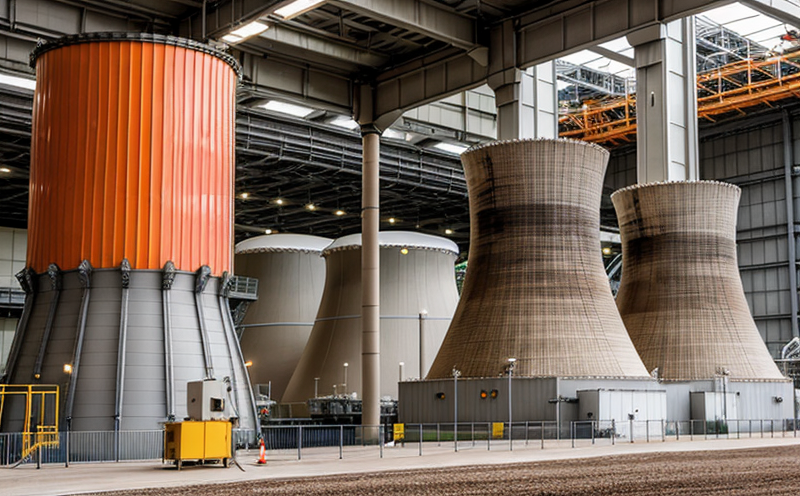Nuclear Power Plant Materials & Components Testing
The testing of materials and components used in nuclear power plants is crucial for ensuring the safety, reliability, and longevity of these critical systems. Nuclear power plants rely on a variety of materials that must withstand extreme conditions, including high radiation levels, corrosive environments, and significant mechanical stresses.
Materials tested include structural steels, pressure vessel components, reactor internals, piping systems, and fuel assemblies. Components such as steam generators, turbines, and containment structures are also subjected to rigorous testing procedures. These tests aim not only to verify the physical properties of materials but also to assess their integrity under simulated operational conditions.
Testing methods include mechanical property evaluations (strength, ductility), non-destructive examination techniques (radiography, ultrasonic testing), and specialized testing for radiation resistance and corrosion behavior. Compliance with international standards such as ISO 17635:2019 and ASTM E448-19 is essential to ensure that materials meet the stringent requirements of the nuclear industry.
Furthermore, these tests are designed to identify potential weaknesses or defects in the manufacturing process. By conducting thorough inspections early in the lifecycle of a material or component, manufacturers can prevent costly failures and enhance overall system safety. This proactive approach is critical given the high stakes involved in maintaining the integrity of nuclear facilities.
The testing laboratory must be equipped with state-of-the-art equipment capable of simulating real-world conditions as closely as possible. For instance, specialized chambers are used to replicate high-pressure steam environments or neutron fluxes found within a reactor core. Additionally, advanced materials characterization tools like electron microscopy and X-ray diffraction provide detailed insights into the microstructure and composition of tested samples.
It is imperative that laboratories adhering to this service possess certifications from recognized bodies such as ASME (American Society of Mechanical Engineers) or ENEA (Italian National Agency for New Technologies, Energy and Environment). These credentials ensure both the competence of personnel involved in testing and the accuracy of results produced.
Compliance with international standards is not only mandatory but also helps build trust among stakeholders. Standards like IAEA (International Atomic Energy Agency) guidelines provide a framework that ensures consistency across different facilities worldwide, promoting interoperability between various nuclear power plants globally.
Eurolab Advantages
- Comprehensive Testing Capabilities: Eurolab offers a full range of testing services tailored specifically for the materials and components used in nuclear power plants. From initial material characterization to final inspection, we cover all aspects.
- ISO 17635:2019 Compliance: Our laboratories are certified according to ISO 17635:2019, ensuring that our tests meet the highest industry standards.
- Expertise in Nuclear Standards: Eurolab’s team comprises experts who understand both European and international nuclear regulations. They stay updated with the latest developments to provide accurate interpretations of relevant codes and practices.
Why Choose This Test
1. Ensures Safety: By thoroughly testing materials before their deployment in nuclear power plants, potential hazards can be identified early on, reducing the risk of catastrophic failures.
2. Meets Regulatory Requirements: Compliance with international standards is crucial for regulatory approval and operational safety. Eurolab ensures that all tests align precisely with these requirements.
3. Enhances Reliability: Rigorous testing helps ensure that components perform reliably over their entire lifecycle, which is vital considering the long operational periods typical of nuclear power plants.
4. Cost-Efficiency: Early detection of defects through comprehensive testing can save significant costs by avoiding costly repairs or replacements later in the asset's life cycle.
Competitive Advantage and Market Impact
The ability to perform accurate, reliable, and compliant nuclear power plant materials and components testing provides a clear competitive advantage. Organizations that can demonstrate their commitment to quality through such stringent testing are more likely to win contracts from prestigious clients in the nuclear sector.
Moreover, adhering to international standards enhances reputation both domestically and internationally, attracting investors who seek partners committed to excellence. In an increasingly globalized market, this aspect becomes even more crucial as companies expand their operations into new markets.
The outcomes of these tests also contribute significantly towards improving the overall safety record within the nuclear industry. By continuously pushing boundaries in terms of what can be tested and how effectively it’s done, Eurolab plays a pivotal role in advancing technological capabilities while maintaining high standards of integrity.





